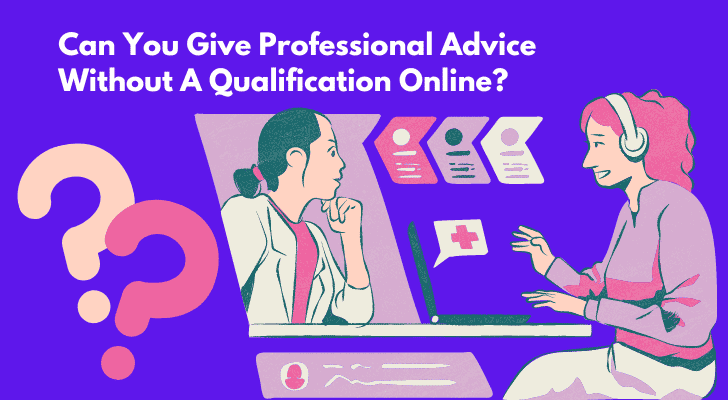Unlocking the vast wealth of knowledge and information available on the internet has never been easier. From cooking tips to DIY home projects, there seems to be an expert for everything online.
True professionals have dedicated time and effort to honing their craft through education, training, and practical experience. Their expertise sets them apart from casual enthusiasts who may lack comprehensive knowledge.
So how do you know who is truly qualified? Can you trust the insights and guidance offered by someone without a formal qualification?

What qualifies as professional advice?
Professional advice refers to guidance given by those who possess specialized knowledge, skills, or qualifications in a specific field. It goes beyond general information and offers expert insights that can help solve problems.
Qualifications for professional advice can vary depending on the subject matter. It may require formal education, such as a degree or certification. Medical professionals are qualified to give advice based on their extensive training and experience in healthcare.
In other instances, relevant work experience and expertise might be sufficient qualifications. This could include professionals like career coaches who offer guidance on job-hunting strategies based on their years of working in recruitment.
Although experts are expected to stay up-to-date with current trends and developments, some of them don’t and leave their advisory site with outdated information available.
For that reason, not all advice found online really is professional advice. You shouldn’t believe everything offhand - you should always check the sources. Take the time to verify their credibility by examining their background, and relevant experiences, and assessing feedback from others who have benefited from their insights.
Who Can Give Professional Advice?
The truth is, anyone can offer advice, but not everyone is qualified to provide professional advice.
- Financial Advisor: A financial advisor can offer guidance on investments, retirement planning, tax strategies, and overall financial management.
- Legal Counsel: Lawyers specialize in various areas of law and can provide legal advice and representation based on their expertise.
- Medical Professionals: Doctors, specialists, and other healthcare professionals can provide advice related to specific health conditions, treatments, and general well-being.
- Career Counselor: Career counselors can help individuals with career planning, job search strategies, and professional development.
- Business Consultants: Business consultants offer advice and guidance to companies on various aspects such as strategy, operations, marketing, and finance.
- Mental Health Professionals: Psychologists, therapists, and counselors provide support and advice on mental health issues, personal development, and relationship challenges.
- Personal Trainers: Fitness professionals can offer advice on exercise routines, nutrition, and overall physical well-being.
- Life Coaches: Life coaches provide guidance and support in achieving personal and professional goals.
When Is It Appropriate To Give Professional Advice?
When it comes to giving professional advice - your words can potentially impact other people’s lives. So think about whether you are in the right position or not.
Know What You're Talking About

Make sure you have the right knowledge and qualifications to give advice in a specific area. It's important to be an expert in the subject you're advising on.
Understand the Situation
Giving advice online can be tricky because you might not have all the information about someone's unique circumstances. Some situations may require more in-depth conversations that are better suited for face-to-face or formal consultations.
Be Ethical
Always respect people's privacy and boundaries when giving advice online. Keep their personal information confidential and put their well-being first.
Follow the Rules
Some professions have specific rules or laws about giving advice, especially in areas like law, medicine, or finance. Make sure you're aware of any regulations that apply to your profession.
Remember the Limitations
Online communication has its limitations, so be aware that text-based conversations may not be as clear or detailed as talking in person. Some situations might require a more interactive and personal approach.
Make Disclaimers
Let people know that your advice is based on the information they provide, and it's not a substitute for personalized help from a qualified professional.
Giving Professional Advice Without a Qualification
To avoid legal and ethical issues, it's best to refer people to qualified professionals who have the necessary expertise. Because there are a lot of consequences in terms of legal and ethical issues.
- Breaking the Law: Some professions have specific rules and regulations that only qualified individuals can follow. If you give advice without the necessary qualifications, you may be breaking the law or going against those rules.
- Protecting People: Laws and regulations are in place to protect people's well-being and safety. By advising without the proper qualifications, you may unintentionally put someone at risk.
- Ethical Guidelines: Professions often have ethical guidelines that professionals must follow. These guidelines ensure that people receive accurate and trustworthy advice. Giving advice without qualifications can go against these ethical guidelines and compromise the integrity of the profession.
- Responsibility and Liability: Professionals have a responsibility to provide accurate advice based on their qualifications. If you advise without the right qualifications and something goes wrong, you may be held responsible for any negative consequences that result from your guidance.
When Giving Advice Without A Qualification
When someone asks you for advice but you don't have the specific qualifications, you can follow these suggestions:
Share Personal Experience
Instead of presenting yourself as an expert, you can offer insights based on your own experiences and what has worked for you in similar situations. Make it clear that your advice is subjective and may not apply universally.
Provide General Information
Offer general knowledge or resources that are readily available to the public. Direct individuals to reputable sources such as books, articles, websites, or community organizations that can provide reliable information on the topic.
Encourage Seeking Professional Help
Advise the person to consult with qualified professionals who have expertise in the specific area they need assistance with. Suggest they seek guidance from individuals with the necessary qualifications to provide accurate and reliable advice.
Offer Support and Empathy

Sometimes, people just need someone to listen and empathize with them whatever the problem they may have. You can provide emotional support, be a sounding board, or offer encouragement while being clear that you may not have professional expertise in that particular field.
If You’ve Given The Wrong Advice
If you realize that you have given the wrong advice, it's important to take responsibility for the mistake and rectify the situation. Here are some steps you can follow:
Acknowledge the Mistake and Apologize
Admit to yourself and the person you provided advice to that you made an error. Be honest and transparent about what you've done and why. Don't make long excuses. Explain why your advice turned out to be wrong only if they ask for the explanation.
Offer a sincere apology to the individual affected by the wrong advice. Show empathy and understanding for any negative consequences they may have experienced as a result.
Communicate and Correct
Reach out to the person you advised and inform them of the mistake and the steps you have taken to rectify it as soon as you can.
Be open to answering their questions and addressing any concerns they may have. Provide corrected information or advice as soon as possible. Clearly explain the correct course of action or offer alternative solutions if applicable. Ensure that the corrected advice is accurate and reliable.
Learn From the Mistake
Reflect on the error and use it as an opportunity to learn and grow. Understand what went wrong and take measures to prevent similar mistakes in the future. This may involve seeking additional education or consulting with qualified professionals when uncertain about a particular topic.
Offer Extra Support
Offer any necessary support to help mitigate the negative effects of the wrong advice. This could involve connecting them with the right professionals, providing further resources, or offering any other appropriate assistance.
How I "Finally" Make Over $7,000 Monthly Income
"The most valuable thing I've ever done!"

